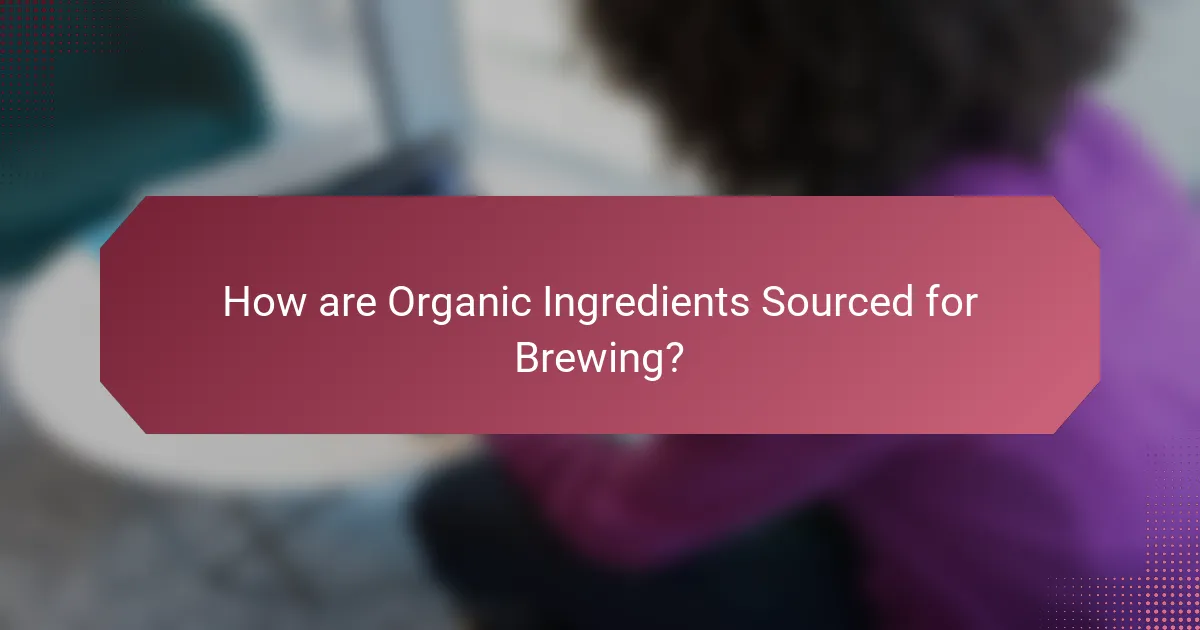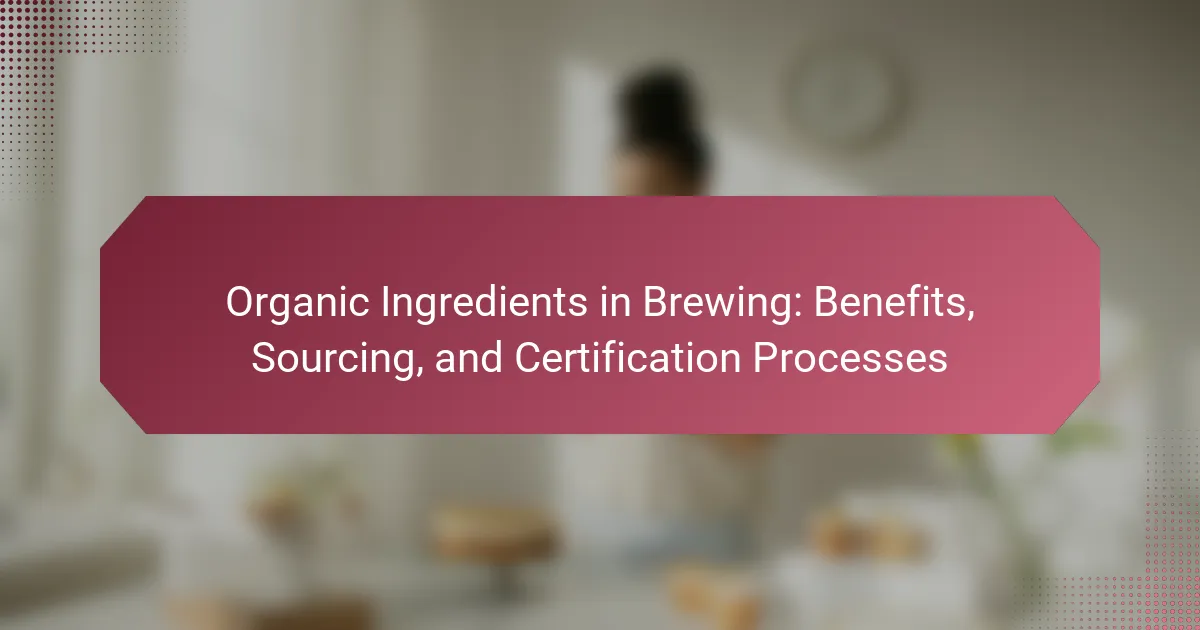Organic ingredients in brewing refer to components such as malt, hops, yeast, and water that are sourced from certified organic farms adhering to sustainable farming practices. These practices prohibit the use of synthetic fertilizers and pesticides, promoting biodiversity and soil health. The article outlines the benefits of using organic ingredients, including enhanced flavor profiles and appeal to environmentally conscious consumers. It details the certification processes governed by the USDA’s National Organic Program, which includes compliance with organic standards, documentation for traceability, and annual renewal of certification. Overall, the focus is on the importance of organic sourcing in promoting sustainable brewing and providing high-quality products to consumers.

What are Organic Ingredients in Brewing?
Organic ingredients in brewing are components sourced from organic farming practices. These ingredients include malt, hops, yeast, and water. Organic farming prohibits synthetic fertilizers and pesticides. This practice promotes biodiversity and soil health. Organic certification ensures compliance with established standards. In the U.S., the USDA regulates organic labeling. Studies show organic ingredients can enhance flavor profiles. Breweries using organic ingredients often appeal to environmentally conscious consumers.
Why are organic ingredients important in the brewing process?
Organic ingredients are important in the brewing process because they enhance flavor and ensure purity. These ingredients are grown without synthetic pesticides or fertilizers. This results in a cleaner taste profile in the final product. Additionally, organic brewing supports sustainable agriculture practices. Studies show that organic crops can have higher antioxidant levels. This can contribute to health benefits for consumers. Moreover, using organic ingredients can attract a growing market of health-conscious consumers. Overall, organic ingredients promote environmental responsibility and product quality in brewing.
What defines organic ingredients in the context of brewing?
Organic ingredients in brewing are defined as components produced without synthetic pesticides, herbicides, or fertilizers. These ingredients must meet specific agricultural standards set by certifying bodies, such as the USDA in the United States. Organic grains, hops, and yeast are cultivated in soil that has been free from prohibited substances for a minimum of three years. Additionally, organic brewing practices prohibit the use of artificial additives and preservatives. This ensures that the final product is made from natural sources. Research indicates that organic brewing can enhance flavor profiles due to the absence of chemical residues. Organic certification also provides transparency to consumers regarding the sourcing of ingredients.
How do organic ingredients differ from conventional ingredients?
Organic ingredients are produced without synthetic pesticides or fertilizers. Conventional ingredients often use these chemicals, which can affect the environment and health. Organic farming practices promote biodiversity and soil health. Studies show that organic farming can lead to higher soil quality and reduced pollution. Organic certification requires adherence to specific agricultural standards. These standards vary by country but generally prohibit genetically modified organisms (GMOs). Conventional farming may use GMOs and other methods not allowed in organic farming. The nutritional content of organic ingredients can be comparable or superior to conventional ones. Research indicates that organic produce may have higher antioxidant levels.
What are the benefits of using organic ingredients in brewing?
Using organic ingredients in brewing offers several benefits. Organic ingredients enhance the flavor profile of the final product. They are grown without synthetic pesticides and fertilizers, resulting in a cleaner taste. This cultivation method supports environmental sustainability. Organic farming practices promote biodiversity and soil health. Additionally, brewers can attract health-conscious consumers. Research indicates that organic beers often contain higher levels of antioxidants. A study published in the Journal of Agricultural and Food Chemistry found that organic hops have a richer chemical composition. These factors contribute to the overall quality and appeal of organic brews.
How do organic ingredients impact flavor and aroma?
Organic ingredients enhance flavor and aroma by preserving natural compounds. These compounds include essential oils and phytochemicals. Such attributes contribute to richer and more complex flavors. Studies show that organic fruits and herbs often have higher concentrations of these compounds. For example, organic tomatoes can contain more flavor-enhancing compounds than conventional ones. Additionally, organic farming practices avoid synthetic fertilizers and pesticides. This leads to a more balanced ecosystem in the soil. The result is ingredients that can impart unique flavors and aromas to the final product.
What health benefits are associated with organic brewing ingredients?
Organic brewing ingredients provide several health benefits. They contain fewer pesticides and chemicals compared to conventional ingredients. This reduces the risk of chemical exposure for consumers. Organic ingredients often have higher antioxidant levels. Antioxidants can help combat oxidative stress in the body. Additionally, organic grains may have better nutritional profiles. They can offer more vitamins and minerals. Studies indicate that organic products may promote better gut health. This is due to the presence of beneficial compounds. Overall, organic brewing ingredients contribute to improved health outcomes.
How do organic ingredients influence sustainability in brewing?
Organic ingredients enhance sustainability in brewing by promoting environmentally friendly practices. They are cultivated without synthetic pesticides or fertilizers. This reduces chemical runoff into water systems. Organic farming also focuses on soil health through crop rotation and composting. Healthier soil leads to better biodiversity. Additionally, organic practices often require less water and energy. A study by the Organic Trade Association shows organic farming can reduce greenhouse gas emissions. Thus, using organic ingredients supports a more sustainable brewing process.

How are Organic Ingredients Sourced for Brewing?
Organic ingredients for brewing are sourced through certified organic farms. These farms adhere to strict regulations set by organizations like the USDA. They utilize sustainable practices that avoid synthetic pesticides and fertilizers. Farmers must maintain organic standards for a minimum of three years before certification. Ingredients such as barley, hops, and yeast are commonly sourced from these farms. Suppliers often provide detailed documentation to verify organic status. This ensures traceability from farm to brewery. The commitment to organic sourcing supports environmental sustainability and health-conscious consumers.
What are the best practices for sourcing organic ingredients?
Best practices for sourcing organic ingredients include verifying certification from recognized bodies. Look for USDA Organic or equivalent certifications. Establish relationships with trusted suppliers who prioritize organic farming. Conduct regular audits to ensure compliance with organic standards. Prioritize local sourcing to reduce transportation impact and support local economies. Stay informed about seasonal availability to optimize ingredient quality. Participate in organic farming initiatives to promote sustainable practices. Utilize transparent supply chains to trace ingredient origins. These practices enhance product quality and align with consumer demand for organic options.
How do brewers establish relationships with organic farmers?
Brewers establish relationships with organic farmers through direct communication and collaboration. They often visit farms to understand practices and build trust. Brewers may also participate in agricultural events to network with farmers. Establishing long-term contracts can ensure a steady supply of organic ingredients. This partnership benefits both parties by promoting sustainable practices. Research shows that such collaborations can enhance product quality. A study by the Brewers Association highlights successful examples of these partnerships. These relationships help brewers maintain organic certification standards.
What challenges do brewers face when sourcing organic ingredients?
Brewers face several challenges when sourcing organic ingredients. Availability of organic crops can be inconsistent due to seasonal variations. Supply chain limitations often hinder access to high-quality organic materials. Price fluctuations for organic ingredients can impact overall production costs. Certification processes for organic ingredients can be complex and time-consuming. Additionally, brewers may encounter limited supplier options for specific organic varieties. Quality assurance can also be challenging, as organic standards vary by region. These factors can complicate the brewing process and affect product consistency.
What are the key factors to consider when sourcing organic ingredients?
Key factors to consider when sourcing organic ingredients include certification, quality, availability, and supplier transparency. Certification ensures compliance with organic standards, which vary by region. Quality involves assessing the freshness and flavor profile of the ingredients. Availability refers to the consistent supply of organic products throughout the year. Supplier transparency is crucial for understanding sourcing practices and traceability. These factors collectively impact the integrity and taste of the final product in brewing.
How does the location of sourcing affect ingredient quality?
The location of sourcing significantly affects ingredient quality. Ingredients sourced from regions with optimal growing conditions tend to have higher quality. For example, specific climates can enhance flavor profiles and nutrient content. Soil quality also plays a critical role in determining ingredient characteristics. Regions with organic farming practices often yield better quality due to reduced chemical exposure. Additionally, local sourcing can lead to fresher ingredients, preserving their natural properties. Studies show that ingredients grown in ideal conditions have superior taste and aroma. This correlation underscores the importance of sourcing location in ingredient selection for brewing.
What role does seasonality play in sourcing organic brewing ingredients?
Seasonality significantly impacts the sourcing of organic brewing ingredients. Organic ingredients, such as hops and grains, have specific growing seasons. These seasons dictate the availability and freshness of the ingredients. For instance, hops are typically harvested in late summer to early fall. This timing affects the brewing schedule for many breweries.
Additionally, seasonal variations can influence flavor profiles. Ingredients sourced at their peak maturity often provide superior taste and aroma. Organic farmers also face challenges due to weather conditions, which can affect crop yields. Unpredictable weather can lead to shortages or price fluctuations.
Breweries must plan their sourcing strategies around these seasonal cycles. This planning ensures they have the necessary ingredients throughout the year. The demand for organic ingredients is growing, making seasonality a crucial consideration. Understanding these seasonal dynamics helps breweries maintain quality and consistency in their products.

What are the Certification Processes for Organic Ingredients in Brewing?
The certification processes for organic ingredients in brewing involve several key steps. First, a brewery must comply with the USDA’s National Organic Program (NOP) standards. This includes using ingredients that are grown without synthetic pesticides or fertilizers. Second, the brewery must undergo a certification process by an accredited certifying agent. This agent reviews the brewery’s organic practices and documentation.
Third, the brewery must maintain detailed records of sourcing and ingredient usage. These records help ensure transparency and traceability. Fourth, periodic inspections are conducted by the certifying agent to verify compliance with organic standards.
Lastly, the brewery must renew its certification annually, which involves submitting an updated organic system plan. This process ensures that the brewery continues to adhere to organic practices. Overall, these steps promote sustainable brewing and ensure that consumers receive high-quality organic products.
What certifications are necessary for organic brewing ingredients?
Organic brewing ingredients require certifications such as USDA Organic and Non-GMO Project Verified. The USDA Organic certification ensures that ingredients meet strict organic farming standards. This includes restrictions on synthetic pesticides and fertilizers. Non-GMO Project Verified certification indicates that ingredients are free from genetically modified organisms. These certifications help consumers identify authentic organic products. They also support transparency in the brewing industry. Compliance with these certifications is essential for breweries marketing organic beers.
How does the certification process ensure ingredient integrity?
The certification process ensures ingredient integrity by establishing strict standards for sourcing and handling. These standards require that ingredients be grown without synthetic pesticides or fertilizers. Certification bodies conduct regular audits of farms and production facilities. They verify compliance through testing and documentation. This includes checking for contamination and ensuring traceability from farm to product. Certification also mandates transparency in ingredient sourcing. This helps consumers trust the quality and authenticity of the ingredients used. Research shows that certified organic products have higher standards for ingredient integrity compared to non-certified products.
What are the costs associated with obtaining organic certification?
The costs associated with obtaining organic certification typically range from $1,000 to $5,000. These costs can vary based on the size of the operation and specific requirements. Initial application fees are often required, which can range from $300 to $1,500. Annual renewal fees are also necessary, typically between $200 and $1,000. Additional costs may include inspection fees, which can be $500 or more, depending on the complexity of the operation. Consulting fees may arise if outside expertise is needed, potentially adding another $1,000 to $3,000. Overall, the total investment in organic certification can exceed $10,000 for larger operations.
Why is it important for brewers to understand certification processes?
Understanding certification processes is crucial for brewers to ensure compliance with industry standards. Certification verifies that ingredients meet specific organic criteria. This knowledge helps brewers source high-quality, organic components. It also aids in marketing products to health-conscious consumers. Additionally, certifications can enhance brand credibility and consumer trust. Non-compliance can lead to legal issues and financial penalties. In 2021, the organic food market reached $61.9 billion in the U.S., highlighting the demand for certified products. Thus, grasping certification processes is essential for success in the organic brewing sector.
How can brewers maintain compliance with organic standards?
Brewers can maintain compliance with organic standards by following strict guidelines set by certifying bodies. They must use ingredients that are certified organic, ensuring no synthetic pesticides or fertilizers are involved. Documentation of all ingredients and their sources is essential for transparency. Regular audits by certifying agents verify adherence to organic practices. Brewers should implement organic handling procedures to prevent contamination with non-organic materials. Training staff on organic standards is crucial for maintaining compliance. Record-keeping of production processes helps in demonstrating compliance during inspections. Lastly, staying updated on changes in organic regulations is necessary for ongoing certification.
What are the consequences of non-compliance in organic brewing?
Non-compliance in organic brewing can lead to significant legal and financial consequences. Breweries may face fines imposed by regulatory bodies. In the United States, the USDA can impose penalties for violations of organic standards. Non-compliance can also result in loss of organic certification. This loss can severely impact marketability and consumer trust. Additionally, brewers may be required to recall products that do not meet organic standards. Such recalls can incur substantial costs and damage a brand’s reputation. Furthermore, non-compliance can limit access to certain markets that require organic certification. These consequences highlight the importance of adhering to organic brewing regulations.
What practical tips can brewers follow when using organic ingredients?
Brewers should prioritize sourcing certified organic ingredients to ensure quality and compliance. This means selecting grains, hops, and yeast that meet organic standards. It is crucial to maintain separate equipment for organic and non-organic products. Cross-contamination can compromise the organic integrity of the brew. Brewers should also monitor ingredient freshness closely. Organic ingredients may have a shorter shelf life compared to conventional ones. Experimenting with local organic suppliers can enhance flavor profiles and support sustainable practices. Regularly reviewing supplier certifications is essential to maintain organic status. Finally, documenting all organic processes is vital for transparency and traceability.
Organic ingredients in brewing refer to components sourced from organic farming practices, including malt, hops, yeast, and water, which are cultivated without synthetic pesticides or fertilizers. The article explores the importance of these ingredients in enhancing flavor and ensuring purity while promoting environmental sustainability. It details the certification processes necessary for organic ingredients, the best practices for sourcing, and the challenges brewers face, including seasonal availability and compliance with organic standards. Additionally, the article highlights the health benefits associated with organic brewing ingredients and their impact on product quality and consumer trust.



